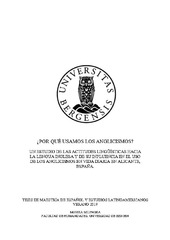| dc.contributor.author | Milewska, Monika | |
| dc.date.accessioned | 2019-06-26T00:33:02Z | |
| dc.date.available | 2019-06-26T00:33:02Z | |
| dc.date.issued | 2019-06-26 | |
| dc.date.submitted | 2019-06-25T22:00:18Z | |
| dc.identifier.uri | https://hdl.handle.net/1956/20446 | |
| dc.description.abstract | Es un hecho que las lenguas vivas cambian con el tiempo y con la evolución. Con la lengua inglesa muy presente en nuestra vida diaria, su influencia sobre otras lenguas es inevitable. El presente estudio hace una investigación sobre las actitudes lingüísticas hacia la lengua inglesa, y como esas actitudes, positivas o negativas, influyen en el curso de la lengua española como una lengua materna. El estudio del presente trabajo, en un mayor grado se basa en una encuesta, llevada a cabo en Alicante, España. La encuesta incorporaba unos métodos cualitativos y cuantitativos de medir la actitud. La primera parte de la encuesta se formaba de dos preguntas, en cuales los encuestados tenían la oportunidad de expresar sus opiniones sobre la lengua inglesa y sobre el uso de los anglicismos en conversaciones coloquiales españolas. En la segunda parte de la encuesta se presentaba quince anglicismos, en cuales base se ha estudiado: primero, el conocimiento a esas palabras y segundo, como los diferentes factores sociales influyen en su uso. Los factores sociales más profundizados en este trabajo serían: el sexo, la edad y el nivel de instrucción. | en_US |
| dc.description.abstract | It is a fact that living languages change over time and with evolution. With the English language very present in our daily life, its influence on other languages is inevitable. The present study makes an investigation on the linguistic attitudes towards the English language, and how those attitudes, positive or negative, influence the course of the Spanish language as a mother tongue. The study of this work, to a greater degree, is based on a survey, carried out in Alicante, Spain. The survey incorporated qualitative and quantitative methods of measuring attitude. The first part of the survey was formed by two questions, in which the respondents had the opportunity to express their opinions about the English language and about the use of Anglicisms in Spanish colloquial conversations. In the second part of the survey, fifteen Anglicisms were presented, on which basis it has been studied: first, the knowledge of those words and secondly, how the different social factors influence its use. The study explores more especially the social factors which are: sex, age and educational level. | en_US |
| dc.language.iso | spa | |
| dc.publisher | The University of Bergen | |
| dc.subject | anglicismos | |
| dc.subject | actitudes lingüísticas hacia la lengua inglesa | |
| dc.subject | sociolingüística | |
| dc.subject | anglicismo | |
| dc.subject | actitudes lingüísticas | |
| dc.subject | variables sociales | |
| dc.subject | Alicante | |
| dc.title | ¿Por qué usamos los anglicismos? Un estudio de las actitudes lingüísticas hacia la lengua inglesa y de su influencia en el uso de los anglicismos en vida diaria en Alicante, España. | |
| dc.title.alternative | Why do we use Anglicisms? A study of linguistic attitudes towards the English language and its influence on the use of Anglicisms in daily life in Alicante, Spain. | |
| dc.type | Master thesis | |
| dc.date.updated | 2019-06-25T22:00:18Z | |
| dc.rights.holder | Copyright the Author. All rights reserved | |
| dc.description.degree | Mastergradsoppgave i spansk og latinamerikastudier | |
| dc.description.localcode | DGSPLA | |
| dc.description.localcode | MAHF-SPLA | |
| dc.description.localcode | SPLA350 | |
| dc.subject.nus | 711128 | |
| fs.subjectcode | SPLA350 | |
| fs.unitcode | 11-20-0 | |
